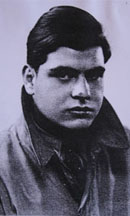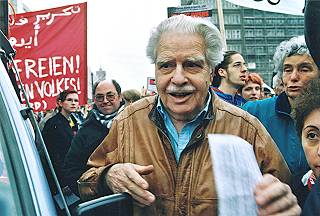The protest demonstrations have already begun, well in advance of the G-8 summit — and they are already sending strong messages. The big summit meeting on June 5th and 6th in the seaside resort of Heiligendamm on the Baltic coast aims at winning a row of Brownie points for Angela Merkel and improving the images of Blair in his last days, Bush in his last year and a half, Sarkozy in his first months, and Putin in general. But the big chiefs will not be alone there; the world is already raising its often angry voice. As it turns out, even the distant past is casting shadows over the meeting — and many omens are far from bright.
Not that security has been neglected. The restrictions for miles around the summit meeting are so tight even squirrels will find it hard to get through — and better not carry any suspicious-looking nuts! The high, 12-kilometer-long fence, topped with barbed wire, is dug so deeply into the ground that it would frustrate a real mole, not just the proverbial old mole, and so well guarded by state-of-the-art detection equipment that even a dog relieving a weak bladder at a fence pole will bring thousands of cops, drafted from all over Germany, racing up to confront the menace with water cannons, rubber and other bullets, and tasers and a new security foam. On the seaside, the beautiful beach along the Baltic is blocked so tight, with a US warship cruising nearby just in case, that not even a rubber swan could slip through.
The preparations may cost well over 90 million euros, mostly at the expense of Germany’s poorest province, but Angela Merkel’s summit guests can carry on their deliberations without fear of terrorists, bystanders, or even school kids (who must make a long detour to get to classes). They will also be kept out of sight and earshot of the expected crowds of demonstrators from all over Europe. In the latest of a series of reversals, the courts have now determined that the no-go zone can be extended well beyond the 200 meters from the original peripheral fence.
But even the most guarded bubble will not keep out news of the many protest marches and demonstrations, some as close to the airport landing field as permitted (or maybe a little closer), others in the streets of the nearby city of Rostock or other sites in the entire region.
One story that they will hardly hear, however, is about the main summit building, the handsome, imposing Kempinski Bristol Hotel, and a kind of curse on it, as revealed at a Berlin press conference on Wednesday, May 30th. The Kempinski firm, founded in 1862 and established in Berlin a decade later, was a well-known, flourishing restaurant business. But the Kempinskis were Jewish, and when the Nazis took over Germany it was forcibly swallowed up by its main non-Jewish competitor in the common practice called “Aryanization.” Some of the family were able to escape Germany and the countries it occupied. Others were not.
The late Melanie Kempinski fled to England with her son Tom, who still lives there. Melanie’s half brother Fritz Teppich escaped to France when the Nazis took over, became an officer of the Spanish Republic during the Civil War, made daring escapes from prisons in Spain and France, and returned to Berlin in 1947, when he learned that his mother and brother had been killed in Auschwitz. He also discovered that Jewish women working for the re-named Kempinski company in Berlin had been deported to Auschwitz directly from the company’s property. He named some of the same men who had grabbed the Kempinski company with the help of top Nazi war criminals like SS boss Ernst Kaltenbrunner and who remained in control after the war.
 |
 |
In the 1950s, the owners, realizing that the name Kempinski could now be useful, took on the old name — but without anyone from the family involved. With the help of the state-connected Lufthansa airline which now became its partial owner, the firm extended its realm of many-starred hotels to 23 countries on all continents, often with the additional name Bristol. Teppich, at 88 still a member of the Berlin peace movement he helped build up, remains bitter that his sister’s family name is being misused. Not an heir himself, he has never sought compensation, but points out that none were ever paid to his British nephew either. His long campaign against the use of the name Kempinski finally resulted in one plaque near the hotel entrance, just off West Berlin’s main shopping street, Kurfuerstendamm, expressing sympathy for the past owners as if the switch in ownership had been fair. Teppich views this as pure hypocrisy.
The Heiligendamm building complex, used by trade-union vacationers and spa patients during the pre-1989 GDR years, but now just a part of the big Kempinski-Bristol concern with its stolen name and its preference for super-prominent guests, will certainly feature large portions of a newer hypocrisy in the days ahead. Angela Merkel and her cabinet ministers, having vocally criticized Putin for crushing organized protests in recent months, pretends that their freedom-loving government permits all open expressions of disagreement. Meanwhile, the police hit the headlines all over Germany raiding homes, confiscating computers and other equipment, roughing up early paraders, and generally seeking to incite fears of the citizenry about some awful violence in early June. The courts zigzagged back and forth but in the end predictably prohibited any demonstrations within a broad perimeter surrounding the summit site, further limited gatherings at the airport or on the highways, and issued whole batteries of restrictive rules for the neighboring city of Rostock. The constantly changing prohibitions made organization extremely difficult, but few became frightened. A wide variety of actions is planned to defy them, from big parade puppets — fairly new in Germany — to concerts with prominent musicians, tent camps, bicycle parades, and special trains from other countries, with a big demonstration scheduled in Berlin for those who cannot make the trip to the northern seacoast. A wide range of organizations will be represented: anti-globalization groups like Attac, anti-fascist groups, peace organizations, the Greens with their stress on ecology, the newly-uniting party The Left (Die Linke), now with increasing popularity in Germany, also a group with a big banner demanding an end to capitalism. All groups and views are welcome except only for the following: “Nazis and other persons or structures with nationalist, fascist, racist, militarist or other anti-human views are not welcome and, as soon as they are recognized, will not be tolerated. We have nothing in common with them!” (Another court is considering a permit for neo-Nazis in a nearby city.)
The government has used the danger of violence, constantly played up in the media, as a justification for its paranoid restrictions. While some radical groups may indeed relish breaking shop windows and damaging cars as ways to get world attention to their protest or themselves, they are only a small minority — and there have been indications in the past that some of the masked men were secretly directed by the police. Any damage they can do, the organizers feel, may be regrettable but must be compared with the carnage and bloodshed going on in Iraq and menacing Iran as well as the hunger, disease, and ecological disaster in the whole world for which Bush — and others — bear so much responsibility.
The handsome buildings in the Heiligendamm complex, when used by ordinary vacationers or convalescents in the years before 1989, were named after the artist Kaethe Kollwitz, the writer Maxim Gorky, the scientist Max Planck, and the socialist leaders Karl Liebknecht and Rosa Luxemburg. This week the names connected with them — Bush, Blair, Merkel, Sarkozy, and Putin — have a different ring altogether. But if, despite all the court decisions, police intimidation, and media obfuscation, the plans of the organizers materialize, these suspicious voices will be matched by the demands of tens of thousands of determined citizens for social improvements, an end to discrimination and exploitation of the global South and the poor people of all countries, strict controls on ecological damage, money for education and health not weapons, and above all peace and justice in the Middle East. If only briefly, the old curse against Kempinski-Bristol and their regal hotel empire will have been lifted, or at least weakened.
Victor Grossman, American journalist and author, is a resident of East Berlin for many years. He is the author of Crossing the River: A Memoir of the American Left, the Cold War, and Life in East Germany (University of Massachusetts Press, 2003).
|
| Print
